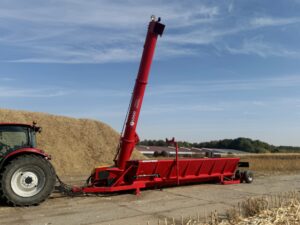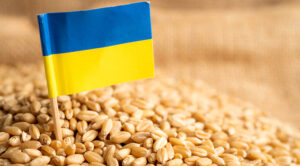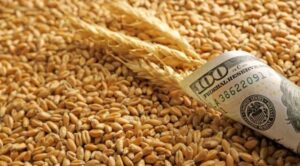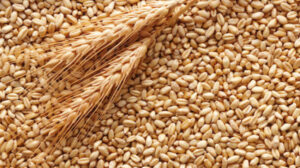
The USAID Economic Support for Ukraine Project (USAID Project) has announced the launch of a grant program to compensate at least 20 Ukrainian agricultural logistics companies for 30% of the cost of grain handling equipment from Kobzarenko Plant LLC, the project’s press service reports on Facebook.
According to the report, the USAID support program for Ukrainian agricultural companies provides that the company buys equipment from the manufacturer for 70% of its cost, and 30% is compensated by the USAID Project. Such business support is expected to increase grain export and transshipment capacity by 2.5 million tons per year.
Micro, small and medium-sized enterprises with annual revenues not exceeding the equivalent of EUR40 million can purchase the equipment at a 30% discount.
This program is not available to agricultural holdings and companies that have already received assistance from USAID or will receive it in the near future, the donor organization added.
As part of the support program, companies can purchase equipment that will help improve the efficiency of grain handling processes at all key nodes of the export route, namely: mobile wagon unloader RVM-180, ground reloading bunker BNP-12 “Ark”, belt loader SN-25 in electric version.
The USAID project has expressed its readiness to compensate 30% of the cost of 51 units of equipment from Kobzarenko Plant.

Ukraine has exported 10.647 mln tonnes of grains and pulses since the beginning of the 2024-2024 marketing year (July-June) as of October 2, 197 mln tonnes of which were shipped on the first day of the month, the press service of the Ministry of Agrarian Policy and Food reported, citing the State Customs Service.
According to the report, as of the same date last year, the total shipments were estimated at 6.676 mln tons, including 7 thsd tonnes in October.
In terms of crops, since the beginning of the current season, 6.207 mln tons of wheat have been exported (a year earlier, the figure was 3.342 mln tons), barley – 1.325 mln tons (622 thsd tonnes), rye – 7.5 thsd tonnes (0.7 thsd tonnes), corn – 2.849 mln tons (2.689 mln tons).
The total exports of Ukrainian flour since the beginning of the season as of October 2 are estimated at 19.9 thsd tonnes (36.4 thsd tonnes), including 17.7 thsd tonnes (35.4 thsd tonnes) of wheat.

As of September 25, Ukraine exported 9.764 mln tonnes of grains and pulses since the beginning of 2024-2025 marketing year (MY, July-June), of which 2.297 mln tonnes were shipped this month, the press service of the Ministry of Agrarian Policy and Food reported.
According to the report, as of the same date last year, the total shipments amounted to 6.152 million tons, including 1.565 million tons in September.
In terms of crops, since the beginning of the current season, Ukraine has exported 5.591 million tons of wheat, including 1.808 million tons in September, 1.245 million tons (132 thousand tons) of barley, 7.5 thousand tons (7.2 thousand tons) of rye, and 2.664 million tons (328 thousand tons) of corn.
The total exports of Ukrainian flour since the beginning of the season are estimated at 17.4 thsd tonnes (5.5 thsd tonnes in September), including 15.7 thsd tonnes of wheat (4.8 thsd tonnes).

The Ukrainian Grain Association (UGA) opposes another increase in railroad tariffs for grain transportation, as it will further hit farmers who have already suffered $80 billion in losses due to Russia’s armed aggression, the association said in a statement.
The UGA recalled that in 2021-2022, Ukrzaliznytsia (UZ) significantly increased tariffs for grain transportation, which led to a 96% increase in the cost of grain transportation. Subsequently, with the outbreak of war, the company resorted to raising tariffs due to a drop in transportation volumes.
“Indeed, during the blockade of Ukrainian seaports by Russia, grain transportation in their direction dropped significantly. However, with the opening of the Ukrainian sea corridor, grain exports from the country’s ports have almost recovered to pre-war levels, and, accordingly, the volume of grain transportation by rail to ports has increased,” the business association noted.
The UGA argues that the 11% increase in grain transportation tariffs proposed by UZ will hit Ukrainian farmers hard, who are suffering losses due to the war, lower global grain prices and lower crop yields this year. This move will make the price of grain uncompetitive on the global market, as exporters will be forced to reduce their purchase prices due to the rising cost of logistics, and as a result, farmers will suffer even greater losses.
At a time when the agricultural sector is one of the drivers of the Ukrainian economy, ensuring food and economic security for a country at war and in dire need of tax revenues, its losses will lead to a drop in production and exports. As a result, tax revenues to the state budget will decrease, and the country will face a shortage of funds to finance the Armed Forces and purchase weapons, the association states.
At the same time, the UGA welcomes UZ’s proposal to unify freight transportation, as the transportation of a ton of cargo costs the same, regardless of whether it is grain or coal. For many years, the Association has been pushing for the unification of railroad transportation tariffs.
According to the UGA, with the opening of the Ukrainian sea corridor, Ukrzaliznytsia has significantly expanded its freight transportation base and increased its own revenues. Therefore, the best way to avoid unprofitability is for the company to optimize costs and improve the efficiency of production processes.

One of the largest grain market operators in Ukraine, Nibulon JV LLC, exported 100 thousand tons of grain to 25 countries using grain carriers and trucks provided by the USAID Ukraine project, the grain trader’s press service reported on its Facebook page.
The agricultural holding recalled that in 2023, Nibulon was forced to switch from water transportation of grain to transportation by road and rail. This alternative solution was helped by the USAID Ukraine economic support project. The Nibulona Project purchased 50 Modern Hope trucks with the capacity to transport 70 tons of grain each. Thanks to this support, Nibulona delivered and exported the first 100 thousand tons of grain to 25 countries.
“We are grateful to our international partners who lend a friendly hand in a difficult time for the company by providing the necessary railcars. This allowed us to continue working, resuming purchases of agricultural products at the blocked river terminals and thus supporting our agricultural partners. The combination of road and rail transport has allowed us to optimize logistics costs and offer purchase prices to farmers that ensure the profitability of their production,” said Nibulon Logistics Director Serhiy Kalkutin and congratulated his colleagues from Danube Transportation.
As reported, in 2023, USAID provided Nibulon with 50 hopper cars built at Karpaty DMZ for grain transportation. In 2024, USAID’s Economic Support for Ukraine provided the grain trader with 13 grain carriers with trailers. “Nibulon also asked the donor organization for assistance in obtaining 250 grain carriers.
Nibulon JV LLC was established in 1991. Prior to the Russian military invasion, the grain trader had 27 transshipment terminals and crop reception complexes, a one-time storage capacity of 2.25 million tons of agricultural products, a fleet of 83 vessels (including 23 tugs), and owned the Mykolaiv Shipyard.
“Before the war, Nibulon cultivated 82 thousand hectares of land in 12 regions of Ukraine and exported agricultural products to more than 70 countries. In 2021, the grain trader exported the highest ever volume of 5.64 million tons of agricultural products, reaching record volumes of supplies to foreign markets in August – 0.7 million tons, in the fourth quarter – 1.88 million tons, and in the second half of the year – 3.71 million tons.
Nibulon’s losses due to Russia’s full-scale military invasion in 2022 exceeded $416 million.
Currently, the grain trader is operating at 32% of capacity, has created a special unit to clear agricultural land of mines, and was forced to move its headquarters from Mykolaiv to Kyiv.

As of August 22, farmers in all regions of Ukraine have already harvested 31.955 million tons of new crops from 6.759 million hectares, the Ministry of Agrarian Policy and Food reported on Friday.
According to the report, more than 28.595 mln tons of grains and 3.36 mln tons of oilseeds have been harvested.
APK-Inform analysts pointed out that only about 46 thou hectares were threshed during the week. The temporary slowdown of the harvesting campaign dynamics can be explained by the fact that the harvesting of two key grain crops (wheat and barley) is almost completed, while the corn threshing has not yet started, the experts noted.
It was specified that 21.74 million tons of wheat were harvested from 4.86 million hectares at a yield of 44.7 c/ha, 5.5 million tons of barley from 1.4 million hectares at a yield of 39.2 c/ha, and 458.5 thousand tons of peas. tons from 207.6 thousand hectares at a yield of 22.1 c/ha, buckwheat – 4.3 thousand tons from 6.2 thousand hectares at a yield of 14.4 c/ha, millet – 11.91 thousand tons from 20.4 hectares at a yield of 17.9 c/ha. Other grains and legumes were harvested in the amount of 882.8 thou tons from 277.3 thou hectares at a yield of 32.4 c/ha.
Ukraine continues to harvest oilseeds. In particular, 3.4 mln tons of rapeseed have been harvested from 1.23 mln hectares with a yield of 27.4 c/ha and 7.2 thou tons of soybeans from 6.6 thou hectares with a yield of 10.9 c/ha. Sunflower was harvested in the amount of 51.7 thou tons from 0.2 thou hectares with a yield of 11.1 c/ha.
Agrarians in a number of regions started digging sugar beets. They harvested 7.2 thou tons of sugar beet from 0.2 thou hectares with a yield of 360 c/ha.